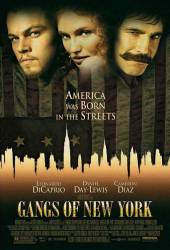Factual error: In a scene set in 1862 or 1863 Bill the Butcher says: 'An Irishman will do for a nickel what a ****** will do for a dime or a white man for a quarter'. The first nickel 5 cent piece was coined in 1866. At the time of the scene the 5 cent coin was a small silver coin called a half-dime. (01:10:00)

Gangs of New York (2002)
Ending / spoiler
Directed by: Martin Scorsese
Starring: Liam Neeson, Cameron Diaz, John C. Reilly, Brendan Gleeson, Jim Broadbent, Leonardo DiCaprio, Daniel Day-Lewis, Henry Thomas
Amsterdam gets to be best friends with The Butcher who had earlier killed Amsterdam's father, until The Butcher realises Amsterdam is the Priest's son. There is then a big riot between the rival sides with Amsterdam leading his father's gang. Amsterdam kills The Butcher, who is then buried next to The Priest (Amsterdam's father), because Amsterdam knew of the respect that the Butcher had for The Priest.
turbo
Bill: He was the only man I ever killed worth remembering.
Question: Can someone please explain to me why the audience and Amsterdam are supposed to hate Butcher so much and think he's a loathesome person? He killed Vallon during a fight, fair and square, and was nothing but respectful to his dead enemy. He almost seemed to have regretted killing Vallon. He didn't act like a worse scum than anyone else until quite a while into the film.
Answer: Because he's very racist. That's why the audience hates him. He's very racist.
Answer: Because he was a racist? Secondarily while others might have acted that badly in his situation he was the one with the power and therefore the one holding a city hostage.
Join the mailing list
Separate from membership, this is to get updates about mistakes in recent releases. Addresses are not passed on to any third party, and are used solely for direct communication from this site. You can unsubscribe at any time.
Check out the mistake & trivia books, on Kindle and in paperback.




Answer: Well, rather obviously, Amsterdam hates him because he killed his father. I mean, wouldn't you? It hardly matters that the fight was fair and that Bill showed respect about it, Amsterdam's not exactly likely to turn round, say "oh, that's alright then" and walk away. William Cutting (or William Poole, as he was in reality) was a ruthless, vicious man, who pretty much stopped at nothing to cement his control of the area. Whether he was actually worse than many of the others is questionable, but the film is based on Amsterdam's view of things - in that view, Bill is the enemy and we're supposed to see him as such.
Tailkinker ★